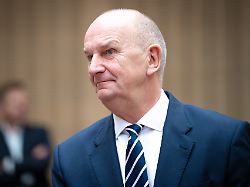“Reduce incentives a little”
Woidke is pushing for benefits in kind for asylum seekers
October 10, 2023, 8:18 a.m
Listen to article
This audio version was artificially generated. More info | Send feedback
The FDP and the Union parties are calling for the financial incentives for migrants to be reduced. Now SPD Prime Minister Woidke also joins in. What is wanted is a switch to benefits in kind. For experts, this change of course is inevitable.
Brandenburg’s Prime Minister Dietmar Woidke is pushing for greater restrictions on immigration and is proposing, among other things, to switch cash payments to asylum seekers to benefits in kind. “In order to at least somewhat reduce the incentives to migrate to Germany, I think switching from cash payments to benefits in kind is a suitable first step,” said the Social Democrat.
So far, this demand has come from the Union parties and the governing party FDP. The coalition partner the Greens has so far been against it. The local associations also resisted this for fear of too much bureaucracy.
Woidke is under pressure because irregular entries across the German-Polish border are increasing significantly, the population’s discontent is growing and he wants to pass a state election next year. The AfD is ahead in the polls. The SPD suffered devastating defeats in the state elections last Sunday in Bavaria and Hesse.
Whatever Woidke wants
“We now need a significant reduction in migration numbers for Germany on the one hand and a stronger fight against smuggling crime on the other,” said the SPD politician. That is first and foremost the task of the federal government. “That’s why the federal and state governments have to come together quickly, because we need a joint effort to finally find solutions to the migration issue.” This Friday, the development is likely to be a topic at the Prime Minister’s Conference.
The head of the Brandenburg government also called for people without the right to remain to be “returned to their home countries more consistently.” “To do this, we have to consistently implement the rules that are already there,” said Woidke.
What the citizens want
An Insa survey for the “Bild” newspaper also shows that there is great dissatisfaction with the current migration policy. The 1,004 respondents were given five topic areas in which they were asked to say whether the federal government should continue as before or take a new course. The strongest demand was for a change of course in migration policy: 59 percent voted for it (continue: 18.5 percent). This is followed by the desire for a change of course in housing policy, which 52 percent supported (continue: 20 percent).
What experts think is necessary
The chairman of the Expert Council for Integration and Migration (SVR), Hans Vorländer, also sees it that way. “I believe that the traffic light government must also ensure changes in migration policy so that the parties that make it up do not come completely under the wheels next year,” said the chairman of the independent panel of experts.
Vorländer attributes the great desire for change to the fact that municipalities complain about their burden in accommodating and caring for refugees, as well as to the political discourse: It is sometimes suggested that there are simple solutions that can greatly reduce the number of people seeking protection, said he.
An important adjustment that the government of the SPD, Greens and FDP must adjust in order to bring more control into immigration is the desired reform of the Common European Asylum System (CEAS). This provides for asylum checks at the EU’s external borders and also returns from there for some of those seeking protection. The SVR chairman warned: “If the CEAS reform is not achieved before the European elections (in June 2024), then a further strengthening of right-wing extremists and right-wing populists in Europe can be expected.”
Source: ntv.de, Christian Andresen, Oliver von Riegen, Anne-Béatrice Clasmann, dpa
